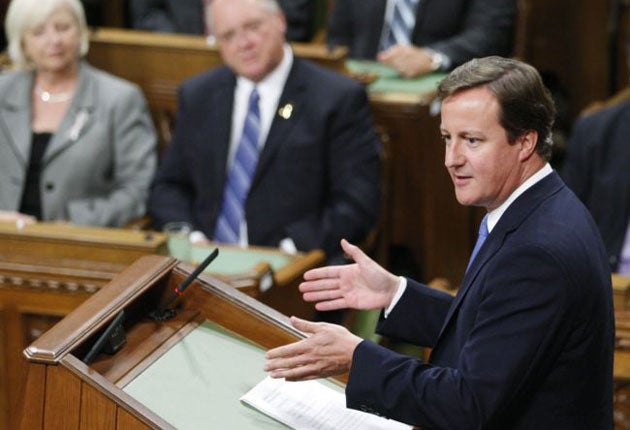David Cameron urges swift action on debt

Prime Minister David Cameron has warned that failure to act swiftly over Eurozone indebtedness would "lengthen the shadows of uncertainty" looming over the global economy.
In a speech before the Canadian parliament, the premier called on indebted nations to make tough decisions in order to repair their broken balance sheets.
Surplus economies had a role to play too by stimulating demand, and refocusing spending to help deficit countries increase their exports, Mr Cameron suggested.
In Ottawa following a two-day visit to New York, Mr Cameron pressed home the need for quick action to avert the Eurozone crisis deepening.
Speaking last night at the end of a day which saw global markets tank, Mr Cameron called on European nations to show they had the "political will" to "do what is necessary".
He continued: "One way or another, they have to find a fundamental and lasting solution to the heart of the problem - the high level of indebtedness in many Euro countries."
Banks had to be made strong, and lack of competitiveness challenged, he told Canada's parliament.
"Endlessly putting off what has to be done doesn't help, in fact it makes the problem worse, lengthening the shadows of uncertainty that looms over the world economy," Mr Cameron said.
High oil and food prices, the Japanese earthquake and stagnating growth in Europe and the US had hampered economic recovery, the PM added.
"We are not quite staring down the barrel, but the pattern is clear, the recovery out of the recession for the advanced economies will be difficult," Mr Cameron said.
As well as action by indebted countries, healthy nations must also help out, the prime minister suggested.
He told those gathered in Ottawa: "In a global economy, we need every country in the world to show the leadership to address its problems.
"With others, we continue to argue we need to increase global demand by rebalancing where surplus countries spend more, helping deficit countries to increase their exports and grow faster."
Reiterating his opposition to Britain ever joining the Euro, Mr Cameron said experience had shown that "different countries sometimes need very different economic policies".
But a global response was needed because the size of Eurozone problems are now "so big that they have begun to threaten the stability of the world economy," the Prime Minister added.
"Eurozone countries must act swiftly to resolve the crisis," Mr Cameron said.
Mr Cameron yesterday put his name to a letter to current G20 president France - also signed by the leaders of Australia, Canada, Indonesia, Mexico and South Korea - warning that the path out of recession will be "difficult" and arguing that the world's biggest economies must agree at the Cannes Summit in November to work together to increase global demand without creating unsustainable imbalances.
The six signatories, who do not include the US or any eurozone state, urged swift action to resolve the debt crisis in the single currency area and for measures from Washington to put America's public finances on a sustainable path.
South Africa was involved in discussions about the letter and is understood to share many of the concerns voiced in it, but decided at a late stage that it was not ready to sign up.
The letter was addressed to French president Nicolas Sarkozy who has said the Cannes Summit should be used to help the world find a path back to economic growth.
G20 members represent 85% of the world economy and three years after the group first met to discuss the global financial crisis in 2008, its "reverberations" are still being felt around the world, said the letter.
"We need decisive action to support growth, confidence, and credibility," the signatories warned.
PA
Join our commenting forum
Join thought-provoking conversations, follow other Independent readers and see their replies
Comments